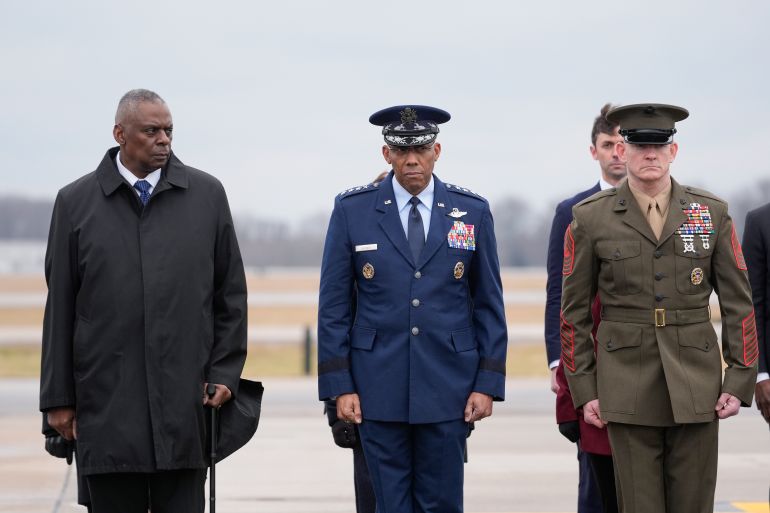‘Overshadow Gaza crimes’: World reacts to US attacks on Iraq and Syria
Iran, Iraq and Syria have strongly condemned the US strikes, saying they will only escalate regional tensions.

The United States has conducted a wave of air strikes on Iran-aligned targets in Iraq and Syria in retaliation for an attack that killed American soldiers in Jordan.
On Saturday, Iraq said 16 people, including civilians, were killed on its soil, and a monitoring group reported 18 people were killed in Syria.
Keep reading
list of 3 itemsHow Israel’s flooding of Gaza’s tunnels will impact freshwater supply
Shooting war: Gaza’s visual storytellers under ‘blatant’ attack
Washington has warned of more strikes to purportedly deter the Iran-backed “axis of resistance” amid Israel’s war on Gaza. In announcing the overnight attacks, US President Joe Biden said: “Our response began today. It will continue at times and places of our choosing.”
Here is how the world reacted to the US action:
Iran
“The attacks are a violation of the sovereignty and territorial integrity of Iraq and Syria, international law, and a clear violation of the United Nations Charter,” said Ministry of Foreign Affairs spokesperson Nasser Kanaani.
“In addition to an all-out support of the US for four months of relentless and barbaric attacks by the Zionist regime against the residents of Gaza and the West Bank, and military attacks on Yemen and violating the sovereignty and territorial integrity of the country, last night’s attacks on Syria and Iraq were another adventurous action and another strategic error by the US government which will have no result but to intensify tensions and instability in the region.”
“The attacks merely support the goals of the Zionist regime. Such attacks increasingly involve the US government in the region and overshadow the crimes of the Zionist regime in Gaza.”
Iraq
“This aggressive strike will put security in Iraq and the region on the brink of the abyss,” the Iraqi government said in a statement, and denied Washington’s claims of coordinating the air raids with Baghdad as “false” and “aimed at misleading international public opinion”.
The presence of the US-led military coalition in the region “has become a reason for threatening security and stability in Iraq and a justification for involving Iraq in regional and international conflicts”, read the statement from Prime Minister Mohammed Shia al-Sudani’s office.
“Iraq reiterates its refusal to let the country be an arena for settling scores,” said government spokesperson Basim Alwadi.
Yahya Rasool, the Iraqi military spokesperson, said the attacks “constitute a violation of Iraqi sovereignty, undermine the efforts of the Iraqi government, and pose a threat that could lead Iraq and the region into dire consequences”.
“The outcomes will have severe implications on the security and stability in Iraq and the surrounding region,” Rasool added.
Syria
The Ministry of Foreign Affairs said the strikes served to “inflame the conflict in the Middle East in an extremely dangerous way” and added to Washington’s “record of violations against Syria’s sovereignty, territorial integrity, and the safety of its people, proving once again that it is the main source of global instability”.
The military said, “The area targeted by the American attacks in eastern Syria is the same area where the Syrian Arab Army is fighting the remnants of the Daesh [ISIL] terrorist organisation, and this confirms that the United States and its military forces are involved and allied with this organisation, and are working to revive it as a field arm for it both in Syria and Iraq by all dirty means.”
“The aggression of the American occupation forces at dawn today has no justification other than an attempt to weaken the ability of the Syrian Arab
Army and its allies in the field of fighting terrorism, but the army.”
Islamic Resistance in Iraq
The coalition of US and Israel-opposed armed groups in Iraq, which had “suspended” its attacks earlier this week, said it launched drones at a US base in Erbil.
Al Jazeera’s Mahmoud Abdelwahed reported from Baghdad that Iraqi groups have also carried out attacks with missiles targeting the al-Tanf military base in Syria which is home to US personnel, as well as the Ain al-Assad base in western Iraq.
Hamas
“We condemn in the strongest terms the American aggression against Iraq and Syria, and consider it a dangerous escalation, an infringement on the sovereignty of the two Arab countries, and a threat to their security and the stability of the region, in service of the occupation’s expansionist agenda and covering up its horrific crimes against our Palestinian people in the Gaza Strip,” read a statement from Hamas.
“The administration of US President Biden bears responsibility for the consequences of this brutal aggression against both Iraq and Syria, which adds fuel to the fire, and we affirm that the region will not witness stability or peace except by stopping the Zionist aggression, crimes of genocide and ethnic cleansing against our people in the Gaza Strip, and ending the Zionist-Nazi occupation.”
Hezbollah
“Hezbollah strongly condemns the blatant American aggression against Iraq and Syria. What the United States of America has done is a blatant violation of the sovereignty of the two countries, an attack on their security and territorial integrity, and a shameless violation of all international and humanitarian laws,” the Lebanese group said in a statement.
Russia
“It is obvious that the airstrikes are deliberately designed to further inflame the conflict,” said Russia’s foreign ministry spokeswoman Maria Zakharova. “By attacking, almost without pause, the facilities of allegedly pro-Iranian groups in Iraq and Syria, the United States is purposefully trying to drive the largest countries in the region into conflict.”
Russia also called an “urgent” United Nations Security Council meeting over the US strikes.
“We just demanded an urgent sitting of the UN Security Council over the threat to peace and safety created by US strikes on Syria and Iraq,” Moscow’s diplomat at the UN, Dmitry Polyansky, said on social media on Saturday.
European Union
“Everybody should try to avoid that the situation becomes explosive,” said EU foreign policy chief Josep Borrell.
While Borrell did not address the US strikes directly, he repeated a warning that the Middle East “is a boiler that can explode”.
He pointed to the war in Gaza, violence along the Israel-Lebanon border, bombings in Iraq and Syria, and attacks on shipping in the Red Sea. “That’s why we call everybody to try to avoid an escalation.”
United Kingdom
“The UK and US are steadfast allies. We wouldn’t comment on their operations, but we support their right to respond to attacks,” a British government spokesperson said in a statement.
“We have long condemned Iran’s destabilising activity throughout the region, including its political, financial and military support to a number of militant groups.”
Poland
“Iran’s proxies have played with fire for months and years, and it’s now burning them,” Polish Foreign Minister Radoslaw Sikorski told reporters as he arrived for a meeting with his EU counterparts in Brussels.

US House speaker
Mike Johnson, the Republican speaker of the US House of Representatives, accused Biden of “placating” Tehran after the strikes, and said that “to promote peace, America must project strength”.
Council on American-Islamic Relations
“Instead of waging war across the Middle East, the Biden administration should demand an end to the far-right Israeli government’s ethnic cleansing and genocide in Gaza,” said CAIR’s National Executive Director Nihad Awad.
The US has ignored Israel’s “escalating human rights abuses”, maintained its troops in Syria, Iraq and other places “where they are not welcome”, and refused to re-enter the Iranian nuclear deal, Nihad noted.
“These latest strikes in Iraq and Syria are just further evidence of the total failure of the president’s Middle East policy. President Biden should change course to protect both American soldiers and people of the region from more violence … Justice and freedom for the Palestinian people – not more bombs – is what can build a more peaceful future for the region.”
Analysts
Trita Parsi, executive vice president of the Quincy Institute for Responsible Statecraft, questioned the effectiveness of the US bombings.
“The aim is to degrade their ability to strike over a longer period of time, albeit at the risk of starting a regional war. This is ultimately a suboptimal strategy. It would be more effective to reduce their interest in striking against the US … The most effective way to shift the interest of these militias is through a ceasefire in Gaza,” said Parsi.
“There is no escaping this reality: Nothing in the region is likely to de-escalate unless there is de-escalation in Gaza. Unfortunately, Biden’s approach thus far has been to avoid putting material pressure on Israel for a ceasefire.”
Joshua Landis, associate professor and director of the Center for Middle East Studies at the University of Oklahoma, told Al Jazeera that politicians in Washington are pressuring Biden for a stronger response as the US presidential election looms.
“He has to respond, but at the same time he’s made it very clear he does not want to escalate, and that means two things; he can hit Syrians, that’s easy and nobody cares about the Syrian government, but the Americans do care about the Iraqi government.”
“America does not want to get ejected from Iraq, particularly not before the elections in November. So, it wants to be strong, but it doesn’t want to kill too many Iraqis.”
HA Hellyer, a military analyst at the UK-based think tank Royal United Services Institute, told Al Jazeera, adding that if the US wants to de-escalate and not go to war with Iran, the key to that is Gaza.
Washington has “failed to apply any real leverage in order to bring a ceasefire to Gaza, which I think would really diminish the tensions in the region and remove the fuel for this sort of escalation taking place, which is likely to continue over the coming days and weeks and beyond”, he said.